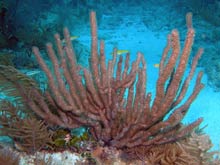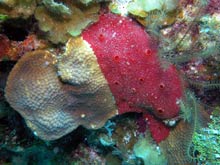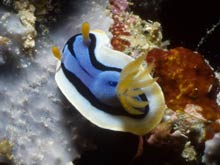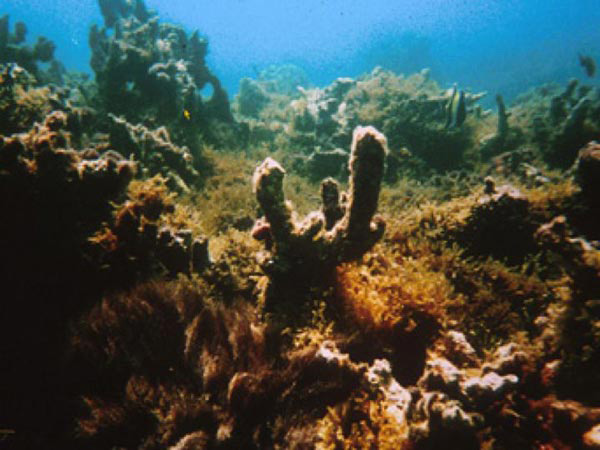
Many shallow water gorgonian corals are protected from predators by marine natural products. Click image for larger view and image credit.
Marine Chemical Ecology
Valerie Paul, Ph.D.
Raphael Ritson-Williams
Marine chemical ecology is a relatively new area of interdisciplinary research which investigates the natural biological functions of marine natural products. Marine natural products, often termed secondary metabolites, can be found in a diversity of marine algae and invertebrates. Secondary metabolites differ from primary metabolites, which are essential for basic cellular and physiological life processes and include compounds such as carbohydrates, DNA, and proteins. In general, primary metabolites are necessary for an organism's basic functions and immediate survival; however, secondary metabolites, which are not present in all organisms, can function as defenses against predators, settlement cues for larvae, inhibition of fouling and overgrowth by competitors, and pheromones in mate-searching behavior. Ecologists have been studying how organisms interact for centuries but only recently have they begun to understand the chemical signaling that is often responsible for these interactions. Marine natural products are as diverse as the functions they serve; over 7,000 natural products have been described from marine organisms including seaweeds, sponges, octocorals, and other invertebrates.

The red sponge (Cliona, on the right) lives in live coral colonies (left). Related sponges use marine natural products to invade and kill coral colonies. Click image for larger view and image credit.
Why are these Compounds Produced?
In many cases, we still know very little about what these natural products do in the producing organism, and how they mediate ecological, behavioral, and physiological processes. The field of marine chemical ecology has been gaining momentum, however, and knowledge about the natural functions of toxic and deterrent marine compounds has increased greatly over the past twenty years. Ample evidence now shows that marine secondary metabolites can mediate ecological and behavioral interactions among organisms. Some compounds function in chemical defense against potential predators and competitors. This is especially important for soft bodied organisms that cannot move away from their predators such as marine algae, sponges, ascidians (tunicates, or sea squirts), and octocorals, which use secondary metabolites to deter predatory fishes, to compete for space, and to control settlement and growth of bacteria and other fouling organisms. Secondary metabolites are also important in reproduction as sex pheromones and sperm-attractant molecules.
Our research on this cruise will focus on deepwater octocorals (sea fans and sea whips). Almost nothing is known about the chemical ecology of deep sea organisms. Specimens of the most abundant species of octocorals will be collected and immediately frozen for subsequent analysis of their marine natural products. Shallow water octocorals produce high concentrations of diverse types of mostly secondary metabolites known as terpenes. The types and concentrations can vary within and between colonies; however, similar studies of the chemical variation and diversity of deep-water octocorals have not been conducted. Dr. Paul's research group will isolate and characterize major metabolites in the most abundant octocorals and examine within- and between-colony variation in the compounds. Results for the deep-water octocorals will be compared with their closest shallow water relatives to begin to understand the chemical diversity of octocorals in these deep-water habitats.

Soft-bodied nudibranchs use toxic chemicals to protect them from predators. This nudibranch obtains its distasteful compounds from its sponge diet. Click image for larger view and image credit.
Marine Biotechnology
Marine natural products serve a variety of functions for ecological interactions but may also be important for humans. Natural products isolated from terrestrial plants and insects are used as medicines and pesticides. Currently, considerable research focuses on the potential biomedical uses of marine natural products. Metabolites from marine organisms have shown antitumor, antiviral, and anti-inflammatory activities, and several of these are currently in clinical trials to establish their effectiveness as new drugs. Another potential application for marine natural products is in the control of fouling organisms on man-made structures. Marine fouling can be a serious economic problem, costing the shipping industry millions of dollars yearly. Algal or invertebrate natural products that naturally inhibit fouling could provide useful alternatives to commercial antifoulant coatings, many of which are toxic to non-target organisms.
Marine organisms represent a relatively untapped resource for these and other biotechnological applications. Many statements have been made about the loss of biodiversity in terrestrial habitats and the resultant loss of species that might yield useful medicines and other products. Only a fraction of terrestrial plant species have been studied for possible medical applications. The same can certainly be said for marine species. Marine natural products chemistry is only a few decades old, and many marine species have not even been identified, let alone studied for their natural products. Through our research we hope to gain a better understanding of the variation and diversity of marine natural products from the deep sea.
























